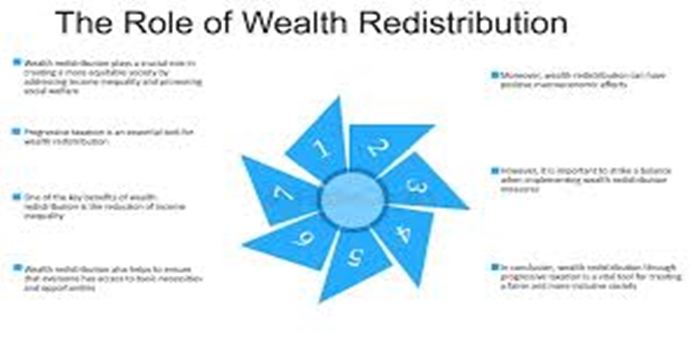In this article, we explained wealth redistribution, how it works, ethical arguments in favor of wealth redistribution, ethical arguments against wealth redistribution, and the ethical values.
Definition
Wealth redistribution is the transfer of wealth and income from some individuals to others, typically through government policies and social programs. The main goal is to reduce economic inequality by ensuring that resources are more evenly distributed across society. typically, through taxation, welfare programs, or public services—sits at the center of moral and political debates around justice, equality, and the role of government.
How it Works
The most common mechanisms for wealth redistribution include:
Progressive Taxation: A system where higher-income earners are taxed at a higher rate. The revenue collected is then used to fund public services and social programs.
Social Welfare Programs: These are government initiatives that provide financial and in-kind assistance to individuals and families in need. Examples include unemployment benefits, food assistance (like food stamps), and housing subsidies.
Public Services: Providing essential services like public education, healthcare, and infrastructure at low or no cost to the public is a form of redistribution. These services are funded by general tax revenue, benefiting all citizens, including those who may not have been able to afford them otherwise
Ethical Arguments in Favor of Wealth Redistribution
- Correcting Structural Inequality
Economic inequality often reflects inherited advantage, discrimination, or historical injustice (e.g., colonialism, slavery, patriarchy). Redistribution helps correct these imbalances and level the playing field.
- Promoting Social Justice and Equity
Redistribution supports fairness by ensuring everyone has access to basic needs like education, healthcare, and housing. It fosters a more just society where opportunities are not dictated by birth.
- Enhancing Social Stability
High inequality can lead to social unrest, crime, and political instability. Ethical redistribution can prevent these issues by maintaining social cohesion and reducing resentment.
- Ethical Use of Collective Resources
Many forms of wealth are generated through public goods—such as infrastructure, education, and law enforcement. It is ethically justifiable for society to claim a share of this wealth to support collective well-being.
Ethical Arguments Against Wealth Redistribution
- Violation of Property Rights
Opponents argue that people have a right to the fruits of their labor and talents. Forced redistribution, through taxation, infringes on this right, making it ethically problematic.
- Undermining Personal Responsibility
Redistribution can create dependency, reduce the incentive to work, and reward irresponsibility, thereby weakening the ethical value of self-reliance and hard work.
- Government Overreach and Inefficiency
From a libertarian or conservative standpoint, governments may lack the competence or moral authority to redistribute wealth effectively. Bureaucratic inefficiency or corruption can make redistribution ethically dubious.
- Potential for Misuse
Redistribution can be manipulated by political elites or special interests, leading to unfair allocation or favoritism rather than genuine justice.
Balancing Competing Ethical Values:
- Identify the Competing Values:
Recognize the conflicting principles:
Pinpoint the specific ethical values or principles that are in conflict. For example, in healthcare, this might involve balancing a patient’s autonomy (right to make their own decisions) with the doctor’s duty to provide the best possible care.
Consider different perspectives:
Acknowledge the viewpoints of all stakeholders involved and how their values might be impacted.
- Analyze the Situation:
Understand the consequences:
Evaluate the potential outcomes of choosing one course of action over another. Consider both the short-term and long-term implications.
Assess the impact on stakeholders:
Determine how each potential decision will affect the individuals and groups involved, including yourself, your organization, and the wider community.
Apply ethical frameworks:
Utilize established ethical frameworks (like utilitarianism, deontology, or virtue ethics) to analyze the situation and guide your decision-making.
- Seek Solutions:
Prioritize ethical considerations:
When a clear resolution isn’t possible, prioritize the ethical principles that are most relevant in the specific context. This might involve identifying the principle that, if violated, would cause the most significant harm.
Look for win-win solutions:
Whenever possible, strive for solutions that minimize harm and maximize positive outcomes for all stakeholders.
Be transparent and accountable:
Communicate your decision-making process openly and honestly, explaining the reasoning behind your choices. Maintain transparency and integrity throughout.
Seek guidance:
Don’t hesitate to consult with ethicists, mentors, or colleagues for advice and support, especially when facing complex dilemmas.
- Continuous Improvement:
Reflect on your decisions:
After making a decision, take time to reflect on the process and the outcome. Identify areas where you could have improved your decision-making or where you might make different choices in the future.
Learn from experience:
Use past experiences with balancing competing ethical values to inform future decisions and refine your approach.
Examples of Competing Values:
Personal gain vs. social responsibility:
A company might face a decision to maximize profits by laying off employees, even though it would cause significant hardship for those individuals.
Confidentiality vs. public safety:
A healthcare professional might have to decide whether to breach patient confidentiality to report suspected child abuse or other illegal activities.
Individual liberty vs. public health:
A government might have to balance the individual’s right to make choices about their own health with the need to protect the population from the spread of infectious diseases.
Conclusion
Wealth redistribution is one of the most ethically complex and politically charged issues in modern society. It reflects deeper questions about what kind of society we want to live in, how we define fairness, and what we owe to one another as human beings. While redistribution may never be universally accepted, ethical reasoning provides a foundation for dialogue, compromise, and justice.

